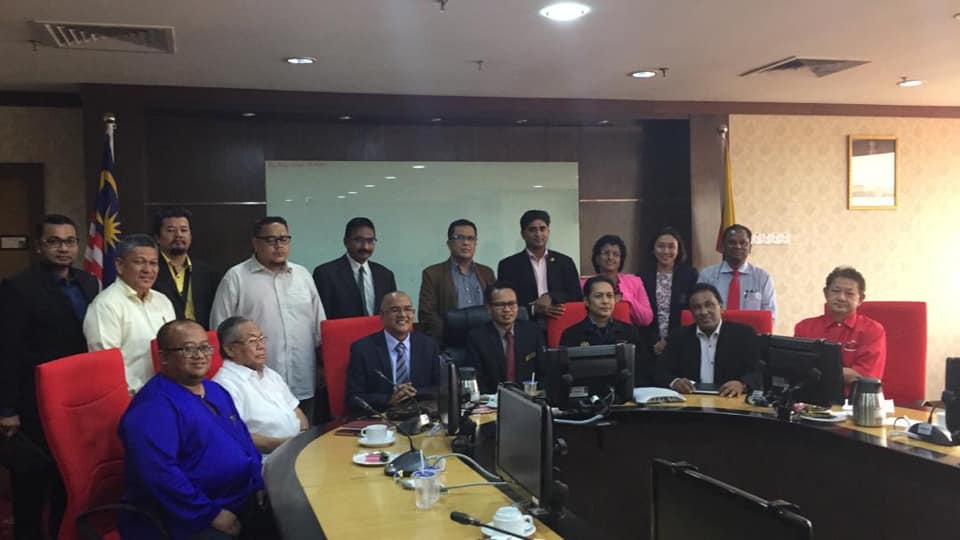
04.02.2019 | PERTEMUAN NGO-NGO TVET DENGAN YBHG. ENCIK MOHD FATHULLAH BIN MUSTAPHA, PENGURUS BESAR (PENGURUSAN), PERBADANAN TABUNG PEMBANGUNAN KEMAHIRAN (PTPK).
Pertemuan adalah mendapatkan penjelasan dan titik penyelesaian bagi isu arahan pekeliling bertarikh 31 Januari 2019 – Ruj: PTPK.P&P.100-3/1 Jld 17 (7) berkenaan Syarat-syarat Baru Permohonan Dana TVET Pinjaman Latihan Kemahiran Skim Pinjaman Lepasan Sekolah Tahun 2019 Bagi Sijil Kemahiran Malaysia Tahap 1, 2 dan 3. Dapatan dari perbinncangan yang dapat saya kongsikan ialah:
01. Tiada lagi kaedah agihan kuota bantuan kepada Penyedia Latihan (PL) sebaliknya peruntukan yang sedia ada perlulah dibida dengan syarat-syarat tertentu.
02. Tahun 2019 adalah menggunapakai pendekatan Industry Driven Funding yang sifatnya menekankan kepada kebolehpekerjaan.
03. Bantuan pinjaman kepada pelatih perlulah akhinya menyediakan pekerjaan yang merubah kehidupan. Ini yang perlu difahami oleh PL.
04. Penilaian melalui pemarkahan yang berbeza-beza apabila PL mampu menyediakan MOA atau MOU atau LOI atau Conditional Letter dari industri berkaitan penempatan pekerjaan kepada pelatih apabila tamat latihan. Walaupun ianya diperdebatkan, namun PTPK menyakini PL mampu membina hubungan dengan industri dan akhirnya manfaat kepada pelatih yang juga merupakan peminjam.
05. Cuma PKPB kekal menolak syarat dokumen berkenaan tidak membenarkan di tandatangani oleh PENGURUS SUMBER MANUSIA. Dokumen perlu ditandatangi oleh Pemilik atau Pengurusan Tertinggi. PKPB melihat syarat ini sesuatu yang “bikin lawak”. Dalam persekitaran perniagaan semasa, telah berlaku perubahan amalan pengurusan sumber manusia yang dahulunya hanya berperanan sebagai pusat khidmat dan sokongan untuk organisasi. Kini, ia lebih daripada sekadar memproses gaji dan pengambilan pekerja baharu. Dalam dunia moden, seorang pengurus sumber manusia memegang beberapa portfolio: rakan niaga, agen perubahan; pentadbir dan pembela para pekerja. Merujuk kepada beberapa kenalan HR Manager, terdapat 3 tugas teras seorang HR iaitu
a. A Line Function,
b. A Coordinative Function
c. Staff Functions [Assist and Advise]
06. PKPB menyokong perlunya Nilai tambah (Added Value) atau Dual Certification di dalam latihan perijilan kemahiran sedia ada. Di dalam hal ini, PKPB mengesyorkan agar Industry Lead Body (ILB) yang dilantik Jabatan Pembangunan kemahiran (JPK) di beri kuasa mengeluarkan sijil tambahan kompetensi berdasarkan industri masing-masing. Menghakupayakan ILB melalui persijilan kepada pelatih akan senang di kawal kualitinya berbading persijilan antarabangsa yang lain.
07. Masih lagi dengan Nilai Tambah (Added Value), PTPK perlu melihat mana-mana PL yang ada program pembangunan belia melalui kemahiran insaniah/softskills hendaklah juga diberi pemarkahan yang baik.
08. PL yang melaksanakan single-tier DKM / DLKM tiada penetapan bilangan peruntukan.
09. Pembidaan bagi peruntukan pinjaman untuk SKM 1-3 tidak melihat kepada kapasiti JPK semata-mata sebaliknya kepada kemampuan PL memenuhi syarat yang ditetapkan.
Apa pun, PKPB melihat sudah sampai masanya semua pihak mengubah cara berfikir dan bekerja dalam menyantuni atau membantu membina anak muda hari ini untuk masa depan negara yang hebat. Isu ini masiih panas dan proses rundingan msih berjalan.
Turut hadir dalam pertemuan ini selain PKPB ialah Persekutuan Pusat-Pusat Bertauliah JPK Swasta Malaysia (FEMAC). Gabungan ILKS Bumiputera (GILKSB). Gabungan ILKS India Malaysia (GAPKIM). Gabungan Pusat-Pusat Kemahiran Swasta Terengganu (GAKENT) dan Tan Sri Zainal Rampak, Tokoh TVET.
Kredit:
RIZAN HASSAN
06.02.2019
